|
"DARWIN, CHARLES.
O Proischozhdenii Vodov... [Russian: On the Origin of Species]. Perevel c anglijskago [translated from English by] S.A. Rachinsky. - [""THE MOST IMPORTANT BIOLOGICAL BOOK EVER WRITTEN"" (FREEMAN)]
S.-Peterburg, 1864. 8vo. Bound in a beautiful recent pastiche-binding of brown half calf with marbled papers over boards and elegant gilding to spine. End-papers renewed. A few dampstains and a bit of brownspotting throughout. A nice copy. XIV, 399, (1) pp. + 1 plate.
Bookseller reference : 56000
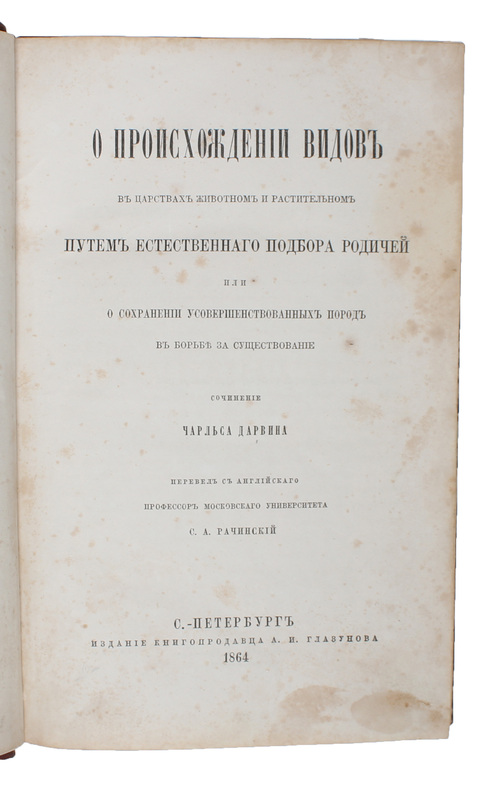
|
|
|
"DARWIN, CHARLES.
O vzniku druhu prirozeným výberem cili Zachováváním vhodných odrud v boji o zivot. [Czech - i.e. On the Origin of Species... Translated by Fr. Klapálek]. - [FIRST CZECH TRANSLATION OF DARWIN'S ""ORIGIN OF SPECIES""]
Praze [Prague], Nákladem Autorovým, 1914. 8vo. In the original red binding with black lettering to spine and front board. Light wear to extremities, inner fronthinge pleit, Internally nice and clean. 389, (1) pp. + 1 folded plate.
Bookseller reference : 61622

|
|
|
"DARWIN, CHARLES.
Obrazovanie rastitel'nago sloa deatel'nost'u dozdevyh cervej i nabludenia nad obrazom zizni poslednih. [i.e. ""Vegetable Mould and Worms""]. [Translated by:] Mihail Aleksandrovic Menzbir.
Moscow, S. P. Arkhipov. 1882. 8vo. In contemporary half calf. Wear to extremities and small stamp to upper right corner of title-page, internally fine and clean. IV, 186 pp.
Bookseller reference : 53617
|
|
|
"DARWIN, CHARLES.
Observations on the Parallel Roads of Glen Roy, and of other parts of Lochaber in Scotland, with an attempt to prove that they are of marine origin.
(London, Richard and John E. Taylor, 1839). 4to. Without wrappers. Extracted from ""Philosophical Transactions of the Royal Society of London."", 1839, Part I. Pp. 39-81 and 2 plates. (1 engraved map and 1 lithographed plate). Both plates with a few brownspots.
Bookseller reference : 54344
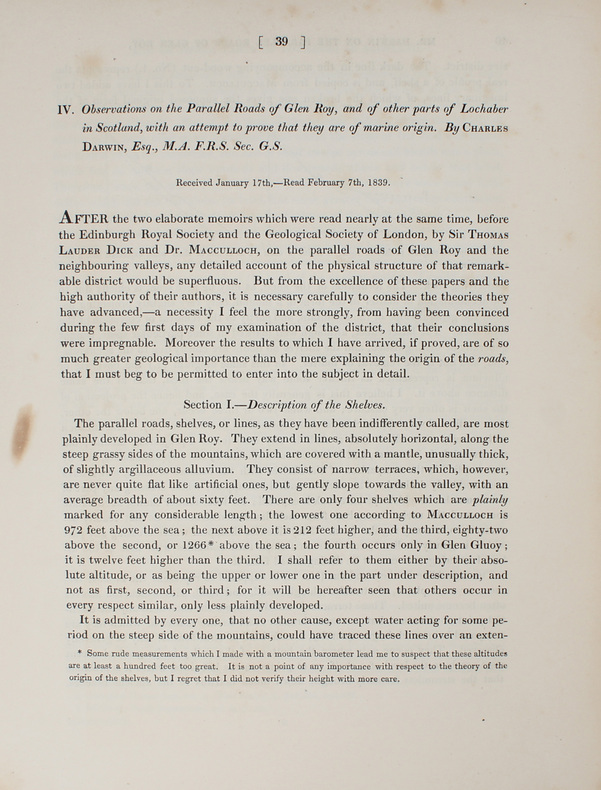
|
|
|
"DARWIN, CHARLES.
Observations on the Structure and Propagation of the genus Sagitta. - [""ONE OF THE MOST ANOMALOUS ANIMALS IN THE WORLD""]
London, Taylor and Francis, 1844. 8vo. In a nice later half morocco binding with five raised bands and gilt lettering to spine. Blind stamped to upper outer corner of first leaf of table of contents. In ""The Annals and Magazine of Natural History"", volume 13. A very fine and clean copy. [Darwin's paper] pp. (1)-6 + 1 plate. [Entire volume:] viii, [1] - 528 + 14 plates (4 hand-coloured).
Bookseller reference : 56990
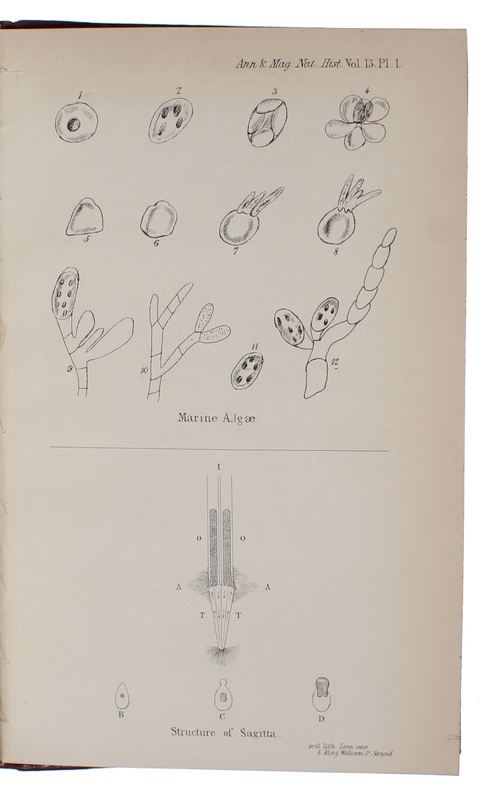
|
|
|
"DARWIN, CHARLES.
Om Arternes Oprindelse ved Kvalitetsvalg (Danish) + Arternes Oprindelse gjennem naturligt Udvalg (Norwegian) + Om Arternas Uppkomst genom naturligt Urval (Swedish). - [INTRODUCTION OF THE ""ORIGIN"" IN SCANDINAVIA]
Kjøbenhavn [Copenhagen], 1872 - (Kristiania [Oslo], 1890) - Stockholm, 1871. A very nice and harmonious set, in four excellent half calf bindings.1) The Danish translation: 1 volume 8vo. A nice contemporary half calf with gilding to spine and gilt title-label. Only light wear. Internally some light brownspotting. (19), XIII, 605, (1) pp.2) The Norwegian translation: 2 volumes small 8vo. Bound in two excellent, uniform, recent red morocco bindings in pastiche-style, with gilt lines to spines. The work is printed in quite bad paper, which is always yellowed and quite brittle. Thus, the first title-page has two small restorations from verso, far from arrecting printing. The second title-page had an old owener's signature and a previous owner's stamp. 379, (5)"" 383 pp.3) The Swedish translation: 1 volume large 8vo. Bound uncut and with the extremely scarce original front wrapper in a lovely later brown half morrocco binding in contemporary style, with five raised bands and gilt author and year to spine. Front wrapper bound on a strip at inner hinge and with a missing outer coner (far from affecting printing). Old owner's name to front wrapper. An excellent copy. XI, (1), 420 pp.
Bookseller reference : 56501
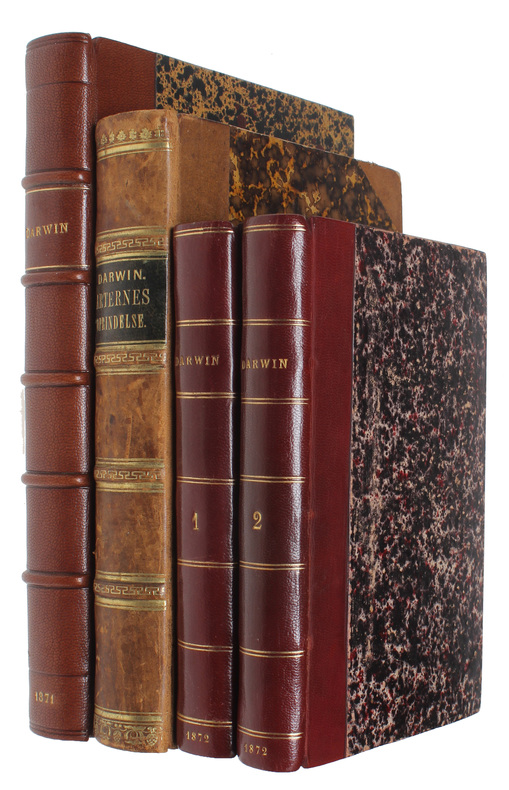
|
|
|
"DARWIN, CHARLES.
Om Arternes Oprindelse ved Kvalitetsvalg eller ved de heldigst stillede Formers Sejr i Kampen for Tilværelsen. Efter Originalens femte Udgave oversat af J.P. Jacobsen. - [FIRST DANISH EDITION OF ""THE ORIGIN OF SPECIES"".]
Kjøbenhavn, Gyldendalske Boghandel (F. Hegel), 1872. 8vo. Bound in contemporary half calf with gilt lettering to spine. Spine rubbed. A few light brownspots throughout. Otherwise a fine and clean copy. (10), XIII, 605, (1) + 1 plate.
Bookseller reference : 48762

|
|
|
"DARWIN, CHARLES.
Om Arternes Oprindelse ved Kvalitetsvalg eller ved de heldigst stillede Formers Sejr i Kampen for Tilværelsen. Efter Originalens femte Udgave oversat af J.P. Jacobsen. - [FIRST DANISH EDITION OF ""THE ORIGIN OF SPECIES"".]
Kjøbenhavn, Gyldendalske Boghandel (F. Hegel), 1872. 8vo. Bound in contemporary half calf with 4 raised bands and gilt lettering to spine. Spine rubbed. A few light brownspots throughout. Otherwise a fine and clean copy. (10), XIII, 605, (1) + 1 plate.
Bookseller reference : 52105
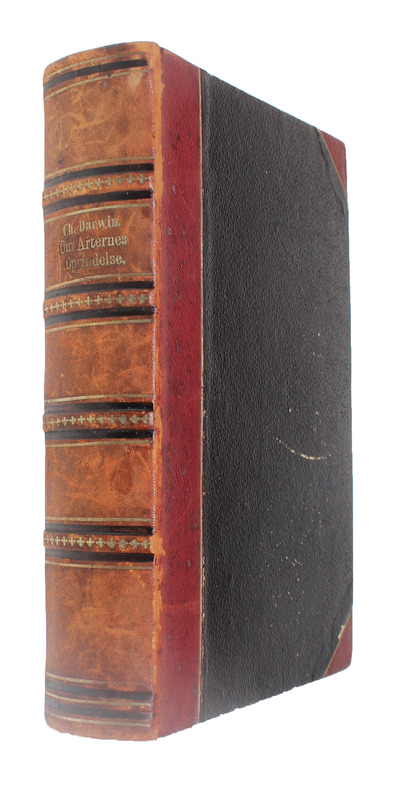
|
|
|
"DARWIN, CHARLES.
Origem das Espécies. [i.e. Portuguese: ""Origin of Species""]. - [FIRST PORTUGUESE TRANSLATION OF 'ORIGIN OF SPECIES'.]
Oporto, Livraria Chardron, de Lello y Irmao, (1913). 8vo. Partly uncut in the original printed wrappers. Spine cracked and front hindge with repair. Wrappers with a few nicks. Half-title with previous owners names. Internally fine and clean. XVI, 477 pp.
Bookseller reference : 55761
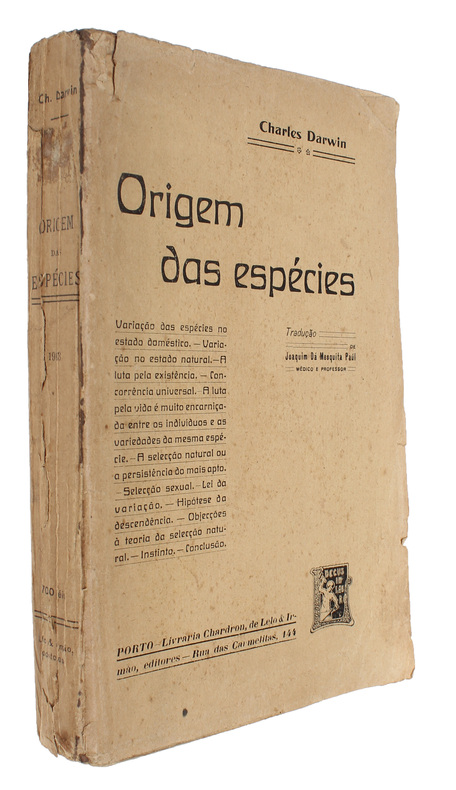
|
|
|
"DARWIN, CHARLES.
Originea Speciilor, prin selectie naturala sau pastrarea raselor favorizate in lupta pentru existenta. (i.e. Romanian ""Origin of Species""). - [FIRST COMPLETE ROMANIAN TRANSLATION OF DARWIN'S ""ORIGIN OF SPECIES""]
(Bucharest), National Academy, 1957. Folio. With the original printed wrappers in publisher's full cloth with gilt lettering to spine and gilt ornamentation to spine forming 6 compartments. A fine copy. (2), LXXXIV, 398, (2) pp. [plate with genealogical tree included in the pagination].
Bookseller reference : 57927
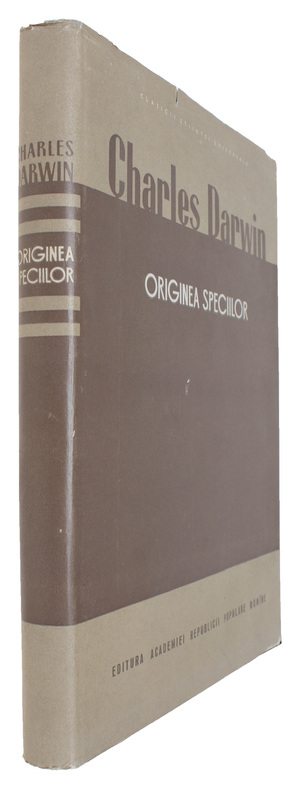
|
|
|
"DARWIN, CHARLES.
Perception in the Lower Animals.
London, 1873. Small folio. Extracted, with traces from the sewn cords, in the original printed wrappers. In ""Nature"", No. 176, Vol. 7, March 13. Entire issue offered. Issue split in two, otherwise fine and clean. Housed in a portfolio with white paper title-label to front board. Darwin's notice: P. 360. [Entire issue: Pp. (1), lxxxvi-xcii, 357-376].
Bookseller reference : 60131
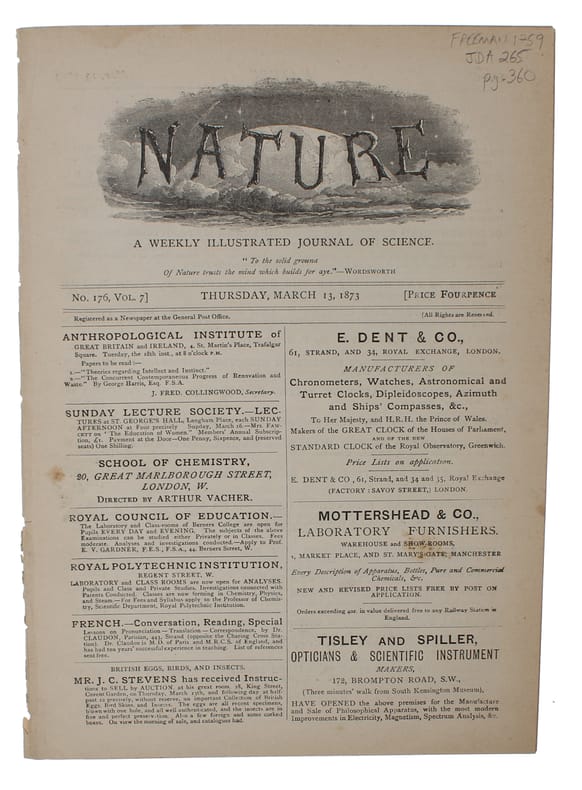
|
|
|
"DARWIN, CHARLES.
Priruchennyie zhivotnyie i vozdelannyie rasteniya [i.e. Russian ""The Variation of Animals and Plants under Domestication"". Translated from English with the consent and assistance of the author by V. Kovalevsky. Edited by I. M. Sechenov, botanical sect... - [THE VERY FIRST PUBLICATION OF DARWIN'S 'VARIATION UNDER DOMESTICATION' IN ANY LANGUAGE. ]
St. Petersburg, 1868 [but in fact 1867-1869]. 8vo. In contemporary half calf with renewed spine. Inner hindges with repairs and boards with soiling and a few marks and holes to volume 1. Light foxing throughout, primarily affecting margins and plates. Overall a good copy. IV, 443, (1): ill"" V.2: 462, (I)-VI pp.
Bookseller reference : 59981
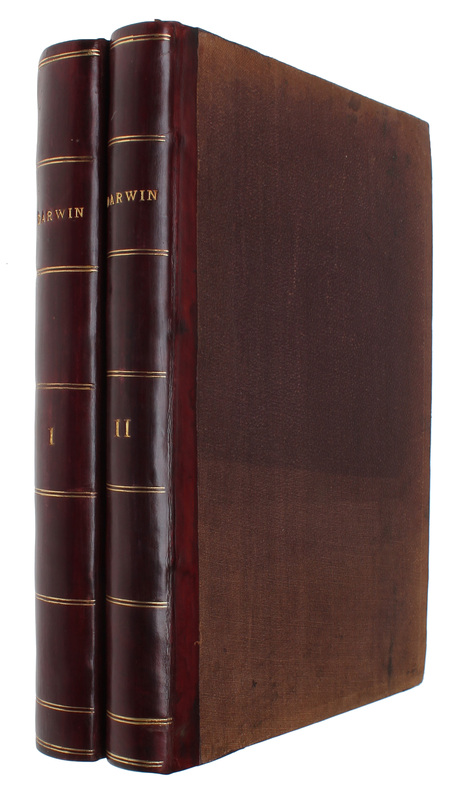
|
|
|
"DARWIN, CHARLES.
Proiskhozhdenie chelovieska i polovoi podbor [i.e. English ""Descent of Man""]. - [FIRST TRANSLATION OF DARWIN'S 'DESCENT OF MAN' INTO ANY LANGUAGE]
S.-Peterburg, Izdanie redaktsii zhurnala ""Znanie, 1871. 8vo. In contemporary black half calf with four rasied bands and gilt lettering to spine. Corners of binding with repairs and a three cm long tear to lower front hindge. Light miscolouring throughout, especially to first 10 leaves. (2), VII, (6), 439 pp.
Bookseller reference : 53279
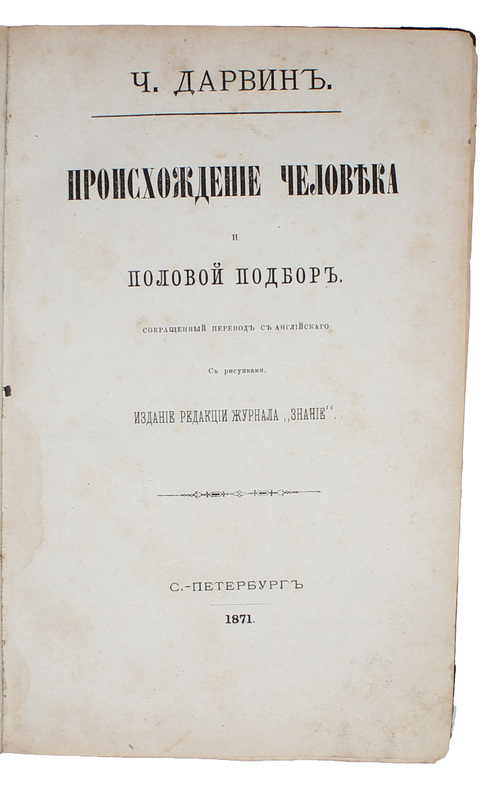
|
|
|
"DARWIN, CHARLES.
Proiskhozhdenie chelovieska i polovoi podbor [i.e. English ""Descent of Man""]. - [FIRST TRANSLATION OF DARWIN'S 'DESCENT OF MAN' INTO ANY LANGUAGE]
S.-Peterburg, Izdanie redaktsii zhurnala ""Znanie, 1871. 8vo. In recent half calf with four rasied bands and gilt lettering to spine. Soiling and damp stain to title-page. Light brownspotting throughout. (2), VII, (5), 439, (7) pp.
Bookseller reference : 56375
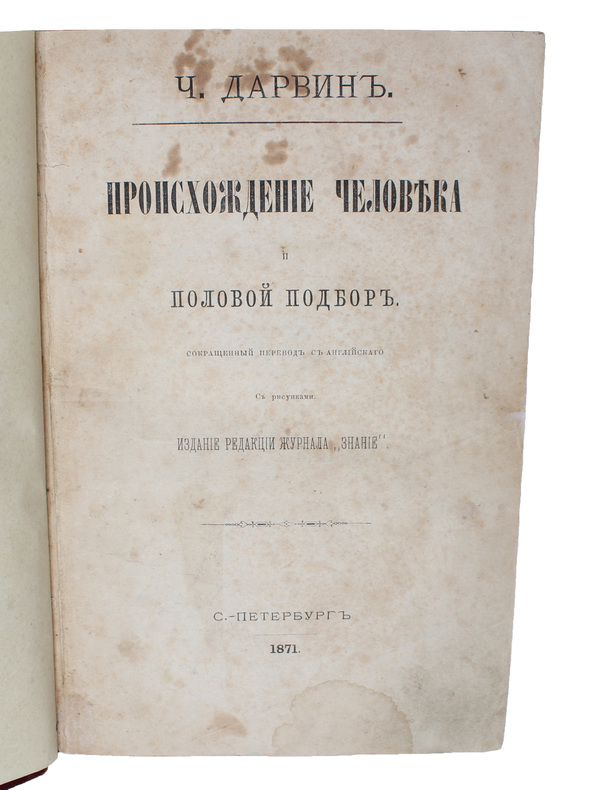
|
|
|
"DARWIN, CHARLES.
Put Jednoga Prirodoslovca Oko Zemlje. Part 1 (All that was published).
Zagreb, Tisak Kr. zemaljske tiskare, 1922. 8vo. Partly uncut in the original printed wrappers. Wrappers with light wear a few nicks. Internally fine and clean. (4), (1)-165
Bookseller reference : 55995

|
|
|
"DARWIN, CHARLES.
Rejse om Jorden. Populære Skildringer. Efter den engelske Originals nyeste, af Forfatteren gjennemsete Udgave. Paa Dansk ved Emil Chr. Hansen og Alfred Jørgensen. Med Illustrationer i Tontryk, et Kort i Farvetryk samt Forfatterens Portræt og Biografi.
Kjøbenhavn, Brødrene Salmonsen, 1876. Samtidigt hldrbd. med rygforgyldning. Lttere brugsspor ved kanter. XXIII,570,(1) pp., portræt, et foldekort, 7 tonede litografier. Indvendigt rent frisk eksemplar.
Bookseller reference : 38650
|
|
|
"DARWIN, CHARLES.
Rejse om Jorden. Populære Skildringer. Efter den engelske Originals nyeste, af Forfatteren gjennemsete Udgave. Paa Dansk ved Emil Chr. Hansen og Alfred Jørgensen.
København., Brødrene Salmonsen, 1876. Lex8vo. Cont.hcalf., four rasied bands and richly gilt spine. Portrait. XXIII,570 pp., textillustr., 7 litographed plates and 1 lithographed folding map. A fine clean copy.
Bookseller reference : 45528
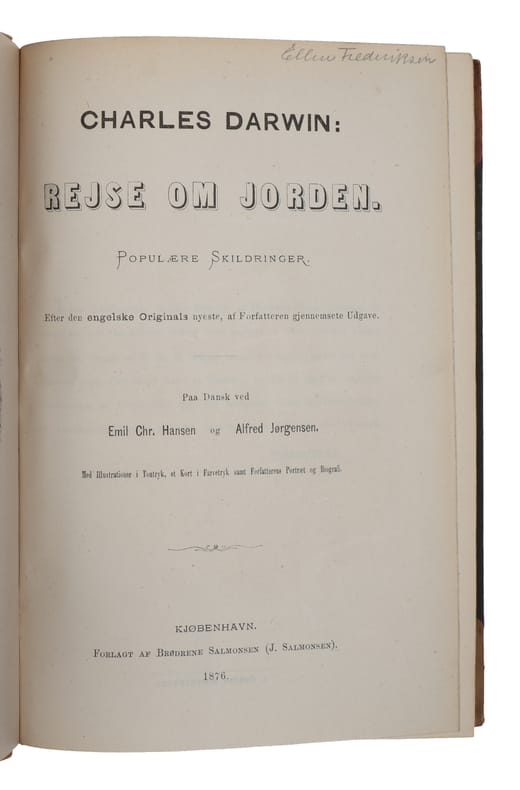
|
|
|
"DARWIN, CHARLES.
Rejse om Jorden. Populære Skildringer. Paa Dansk ved Emil Chr. Hansen og Alfred Jørgensen. Med Illustrationer i Tontryk, et Kort i Farvetryk samt Forfatterens Portræt og Biografi.
Kbhvn., Salmonsen, 1876. Samt. hldrbd. Rygforgyldning. Ryg med brugsspor og slidt ved øvre kapitæl. Startende revnedannelse øverst ved false. XXIII,570,(1) pp. Portræt, 1 foldekort, 7 tonede litografier.
Bookseller reference : 27627
|
|
|
"DARWIN, CHARLES.
Rejse om Jorden. Populære Skildringer. Paa Dansk ved Emil Chr. Hansen og Alfred Jørgensen. Med Illustrationer i Tontryk, et Kort i Farvetryk samt Forfatterens Portræt og Biografi.
Kbhvn., Salmonsen, 1876. Samt. hldrbd. Rygforgyldning. Ryg med brugsspor og kapitæler slidte, rep. Stempel på titelbladet. XXIII,570,(1) pp. Portræt, 1 foldekort, 7 tonede litografier. Indvendig ren.
Bookseller reference : 39460
|
|
|
"DARWIN, CHARLES.
Shurjerkrya chanaparhordutyun BIGL navov [i.e. ""Voyage of the Beagle""]. - [EXCEEDINGLY RARE FIRST ARMENIAN TRANSLATION OF DARWIN'S ""JOURNAL OF RESEARCHES""]
Erevan, Academy of Sciences Armenian S.S.R., 1949. Large8vo. In publisher's original printed cardboard binding. Title printed to spine and front board. A pictures of The Beagle on lower part of front board. Binding with wear to spine, especially to upper part. Back board with a few stains. Internally fine and clean with many text-illustrations throughout. (4), 460 pp. + frontiespiece of Darwin.
Bookseller reference : 59977
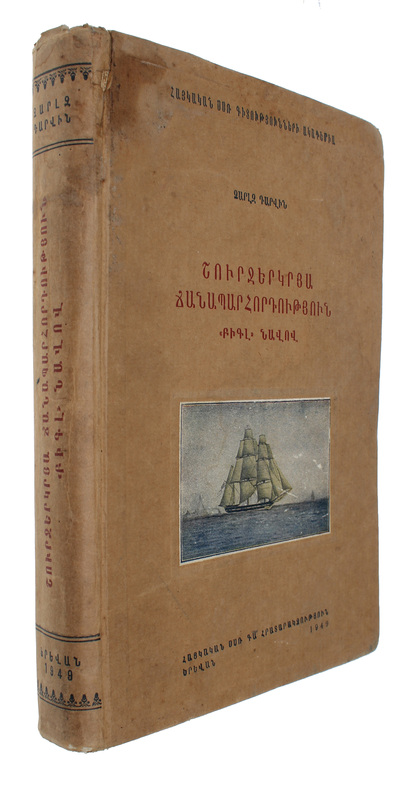
|
|
|
"DARWIN, CHARLES.
Sposobnost rastenij dvischenijo. [i.e. The Power of Movements in Plants]. [translated by:] G. Miloradovich (+) A. Kobelyatskii, - [FIRST RUSSIAN TRANSLATION]
Kief, F. A. Johanson, 1882. 8vo. In contemporary half cloth with gilt lettering to spine. Extremities with wear and spine lacking 1 cm of upper part of spine. Title-page with 8 numbers written in contemporary hand. Pasted down back end-paper with two small stamps, otherwise internally fine. VII, 433 pp.
Bookseller reference : 53459
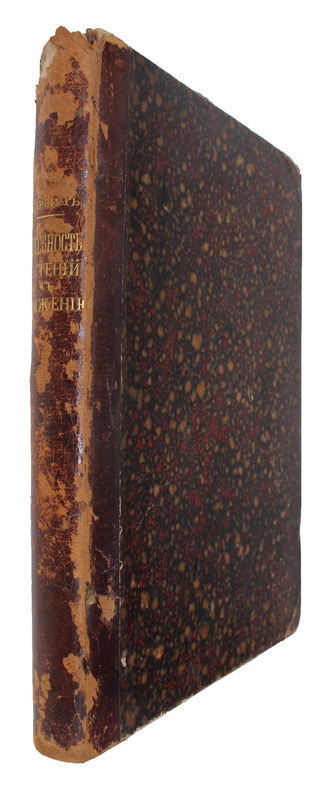
|
|
|
"DARWIN, CHARLES.
Tesakneri tsagumê. [Armenian - i.e. ""Origin of Species"". Translated by S. Sargysan]. - [EXCEEDINGLY RARE FIRST ARMENIAN TRANSLATION OF 'ORIGIN OF SPECIES']
Erevan, Armenia, Gosizdat, 1936. 8vo. In publisher's original full cloth with title in silver lettering to spine and front board. A picture of Darwin embossed to front board. Hindges weak. ""75"" in ink to spine and front board. Stamp and a few annotations to title-page, otherwise nice and clean. (2), 765 pp. + frontiespiece and plate with genealogical tree.
Bookseller reference : 62032
|
|
|
"DARWIN, CHARLES.
Tesakneri tsagumê. [Armenian - i.e. ""Origin of Species"". Translated by S. Sargysan]. - [EXCEEDINGLY RARE FIRST ARMENIAN TRANSLATION OF 'ORIGIN OF SPECIES']
Erevan, Armenia, Gosizdat, 1936. 8vo. In publisher's original full cloth with title in silver lettering to spine and front board. A picture of Darwin embossed to front board. Extremities with wear and hindges weak. Spine miscoloured and remains of paperlabel to upper part of spine. First quire loose. Internally fine and clean. (2), 765 pp. + frontiespiece and plate with genealogical tree.
Bookseller reference : 54837
|
|
|
"DARWIN, CHARLES.
Türlerin Kökeni. - [FIRST TURKISH TRANSLATION OF DARWIN'S 'ORIGIN OF SPECIES']
(Ankara, Sol yayinlari, 1970). 8vo. In the original blue printed wrappers. Light wear to extremities. Small white paper label pasted on to back wrapper. Internally fine and clean. 469, (3) pp. (with the genealogic tree included in the pagination).
Bookseller reference : 59965
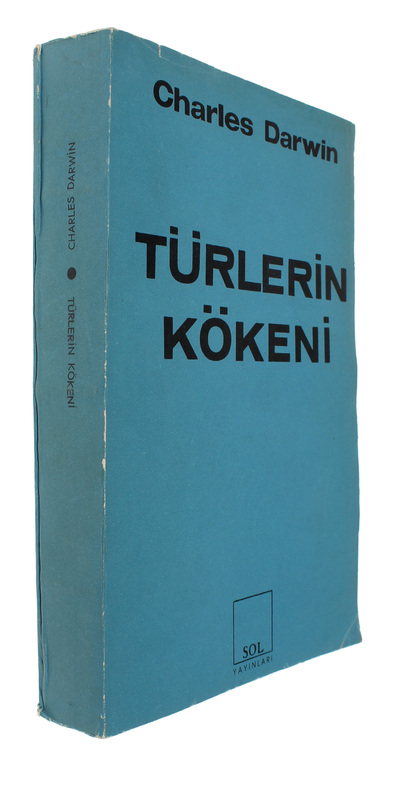
|
|
|
"DARWIN, CHARLES.
Über die Entstehung der Arten im Thier-und Pflanzen-Reich durch natürliche Züchtung, oder Erhaltung der vervollkommneten Rassen im Kampfe um's Daseyn. Nach der zweiten Auflage mit einer geschichtlichen Vorrede und andern Zusätzen des Verfassers für d... - [FIRST GERMAN TRANSLATION OF ""ORIGIN OF SPECIES"".]
Stuttgart, E. Schweizerbart'sche Verlagshandlung und Druckerei, 1860. 8vo. Bound in contemporary half calf with gilt lettering and ornamentation to spine. Small stamp and previous owner signature to title page. Leather on lower part of spine with a tear and part detached. Hinges weak but book-block firmly attached. VIII (including half, 520, (6) pp + 1 plate.
Bookseller reference : 50927
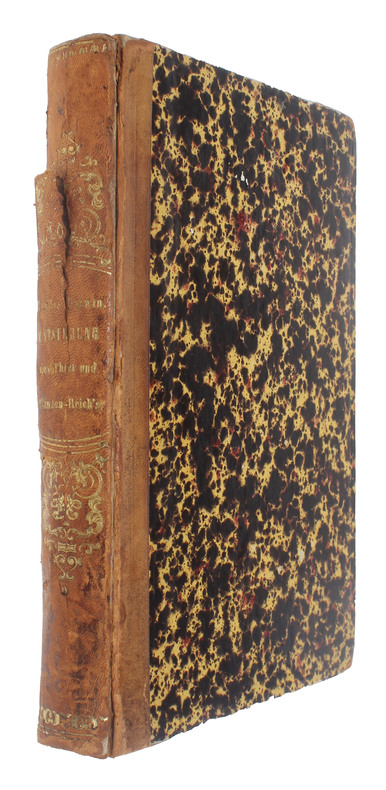
|
|
|
"DARWIN, CHARLES. - FIRST DANISH EDITION OF ""THE ORIGIN OF SPECIES"".
Om Arternes Oprindelse ved Kvalitetsvalg eller ved de heldigst stillede Formers Sejr i Kampen for Tilværelsen. Efter Originalens femte Udgave oversat af J.P. Jacobsen.
Kjøbenhavn, Gyldendalske Boghandel (F. Hegel), 1872. Contemp. hcalf. Spine gilt and with gilt lettering. Spine slightly rubbed. Corners a bit bumped. (10),XIII,605,(1) pp. and 1 folded plate. A few faint brownspots to the first leaves.
Bookseller reference : 47264
|
|
|
"DARWIN, CHARLES. [Translated by:] OLGA GRAHOR.
Potovanje na ladji Beagle. (Slovenian, i.e. ""Journal of researches""). - [FIRST SLOVENIAN TRANSLATION OF DARWIN'S 'JOURNAL OF RESEARCHES'.]
Ljubljana, 1950. 8vo. In publisher's original full cloth binding with printed board. Soiling to extremities and hindges weak. Internally with some offsetting, otherwise clean. 459, (1) pp.
Bookseller reference : 57930
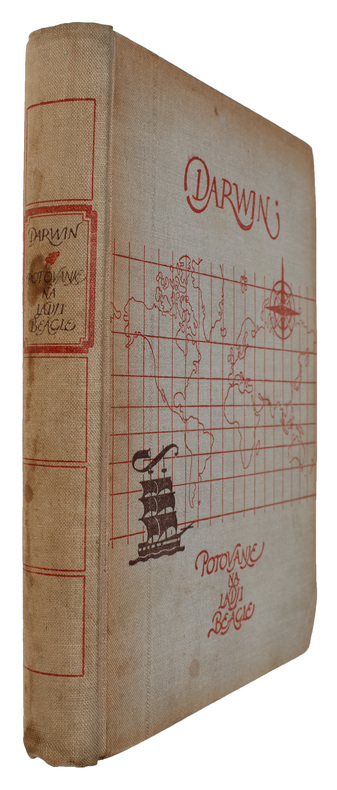
|
|
|
"DARWIN, FRANCIS. - PLANT GROWTH CONTROLLED BY HORMONES.
Observations on Stomata. Received May 31, - Read June 16, 1898.
(London, Harrison and Sons, 1898). 4to. No wrappers as extracted from ""Philosophical Transactions"" Year 1897, Volume 190 - Series B. - Pp. 531-621.
Bookseller reference : 45943
|
|
|
"DARWIN, G. H.
Periodic Orbits [Acta Mathematica] (+) Periodic orbits [Mathematische Annalen]. - [PERIODIC ORBITS]
Stockholm, Beijer, 1897 (+) Leipzig, B. G. Teubner, 1899. [Acta Mathematica] 4to. As extracted from ""Acta Mathematica, 21. Band]. No backstrip. Fine and clean. Pp. 99-242 + 4 plates. [Mathematische Annalen] 8vo. Original printed wrappers, no backstrip. In ""Mathematische Annalen. Herausgegeben von A. Clebsch und C. Neumann. 51. Band. 4. Heft."" Entire issue offered. A fine and clean copy. [Darwin:] Pp. 523-583. [Entire issue: Pp. 481-607 + 4 plates.].
Bookseller reference : 45786
|
|
|
"DARWIN, G.H.
Bakerian Lecture. - On Tidal Prediction. Received December 16, 1890 - Read January 29, 1891.
(London, Harrison and Sons, 1892). 4to. No wrappers as extracted from ""Philosophical Transactions"", 1891, Vol. 182 - Series A. Pp. 159-229. Clean and fine.
Bookseller reference : 42591
|
|
|
"DARWIN, G.H.
On Figures of Equilibrium of Rotating Masses of Fluid. Received April 28, - Read June 16, 1887.
(London, Harrison and Sons, 1888). 4to. No wrappers as extracted from ""Philosophical Transactions"" 1887 - Vol. 178 - Series A. Pp. 378-428 and 2 plates.
Bookseller reference : 44508
|
|
|
"DARWIN, G.H.
On the Influence of Geological Changes on the Earth's Axis of Rotation. Received October 13, - Read November 23, 1876.
(London, Taylor and Francis, 1878). 4to. No wrappers as extracted from ""Philosophical Transactions"" 1877, Vol. 167 - Part I. Pp. 271-312. 3 leaves with minor brownspots to upper margin, otherwise fine and clean.
Bookseller reference : 42424
|
|
|
"DARWIN, G.H.
On the Mechanical Conditions of a Swarm of Meteorites, and on Theories of Cosmogony. Received July 12, - Read November 15, 1888.
(London, Harrison and Sons, 1890). 4to. No wrappers as extracted from ""Philosophical Transactions"", Vol. 180 - A. Pp. 1-69. 2 textillustr. Clean and fine.
Bookseller reference : 42956
|
|
|
"DARWIN, G.H.
On the Tidal Friction of a Planet attended by several Satellites, and on the Evolution of the Solar System. Received December 27, 1880, Read January 20, 1881.
(London, Harrison and Sons, 1881). 4to. No wrappers as extracted from ""Philosophical Transactions"" 1881, Vol. 172 - Part II. Pp. 491-535 a. 3 plates.
Bookseller reference : 44054
|
|
|
"DARWIN, G.H. - A PIONEERING WORK IN COSMOLOGY BY THE ""FATHER OF GEOPHYSICS""
On the Secular Changes in the Elements of the Orbit of a Satellite revolving about a Tidally distorted Planet. Received December 8, - Read December 18, 1879.
(London, Harrison and Sons, 1880). 4to. No wrappers as extracted from ""Philosophical Transactions"", Vol. 171 - Part II. Pp. 713-891. A few textilustr. Clean and fine.
Bookseller reference : 42401
|
|
|
"DARWIN, G.H. - ANNOUNCING THE ""RESONANCE THEORY"" OF THE ORIGIN OF THE MOON.
On the Procession of a Viscous Spheroid, and on the remote History of the Earth. Received July 22, - Read December 19, 1878.
(London, Harrison and Sons, 1880). 4to. No wrappers as extracted from ""Philosophical Transactions"", 1879, Vol. 170 - Part II. Pp. 447-538 and. 1 plate. Clean and fine.
Bookseller reference : 42425
|
|
|
"DARWIN, G.H. - THE MOON THEORY.
Problems connected with the Tides of a Viscous Spheroid. Received November 14, - Read December 19, 1878.
(London, Harrison and Sons, 1880). 4to. No wrappers as extracted from ""Philosophical Transactions"" 1879, Vol. 171 - Part II. Pp. 539-593.
Bookseller reference : 42402
|
|
|
"DARWIN, KAROL [CHARLES DARWIN].
Podróz Naturalisty. [i.e. ""Journal of Researches""]. - [FIRST POLISH TRANSLATION OF DARWIN’S JOURNAL OF RESEARCHES]
Warszawa, 1887. 4to. In contemporary half calf with gilt lettering to spine and four raised bands. Spine with wear and top right corner (3 x 5 cm) of title-page lacking, not affecting text. Internally fine and clean. (4), II, 412, XVIII pp.
Bookseller reference : 53495

|
|
|
"DARWIN, KAROL [CHARLES].
Dobór plciowy. Przetlomaczyl z angielskiego za upowaznieniem autura Ludwik Maslowski. [i.e. Polish: ""Descent of Man"", Translated by Ludwik Maslowski]. 2 vols. - [POLISH TRANSLATION OF DARWIN'S 'THE DESCENT OF MAN']
Lwów, Ksiegarnia Polska, 1875-1876. 8vo. In contemporary half cloth with gilt lettering to spine. Previous owner's stamp and another owner's sginature to title-page. Light wear to extremities, otherwise a fine and clean set. 262, (2)"" 313, (3) pp.
Bookseller reference : 55758
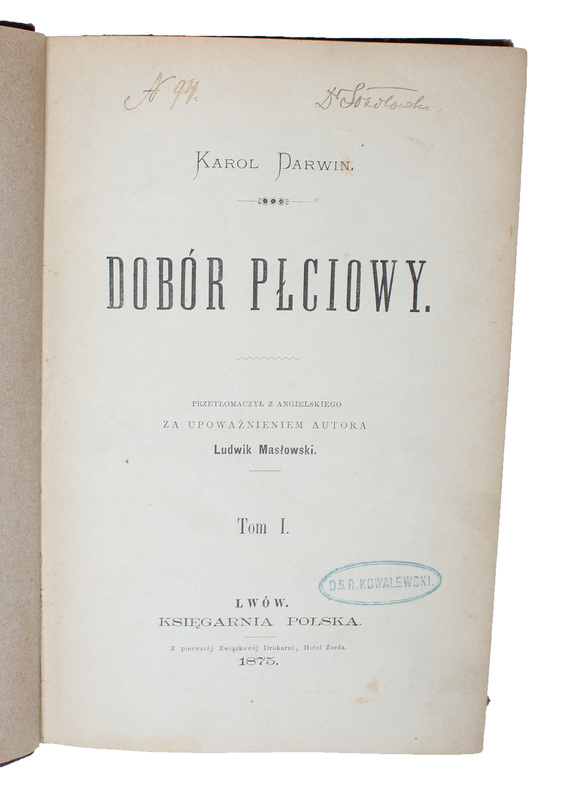
|
|
|
"DARWIN, KAROL [CHARLES].
O Powstawaniu Gatunków. [i. e. Polish: ""Origin of Species""]. [Translated by Szymon Dickstein]. - [FIRST FULL POLISH TRANSLATION OF DARWIN'S ""ORIGIN OF SPECIES""]
Warszawa, Przegladu Tygodniowego, 1884. Large8vo. In contemporary half calf. Spine with wear, lacking the upper 1 cm. Small stamp to title-page. Hindges weak and back board detached from bookblock. Verso of title-page and first leaf on content. 437, (1), XVI [Including the plate] pp.
Bookseller reference : 56005
|
|
|
"DARWIN, KAROL [CHARLES].
Zmiennosc zwierzat i roslin w stanie kultury [i.e. ""The Variation of Animals and Plants under Domestication"", translated by Jozef Nusbaum]. 2 vols. - [RARE FIRST POLISH TRANSLATION OF DARWIN'S 'THE VARIATION OF ANIMALS AND PLANTS UNDER DOMESTICATION']
Warszawa, Wydawnictwo Przegladu Tygodnio, 1888-1889. Large8vo. In two uniform contemporary half calf bindings with four raised bands and gilt lettering to spine. Top right corner (app. 3 x 5 cm) of both title pages cut off" volume 1 not affecting text, volume 2 missing the n in 'Darwin'. Light wear to extremities, otherwise a fine set. (2), X, 11-357, III" (2), 379, IV, VIII, V pp.
Bookseller reference : 53153
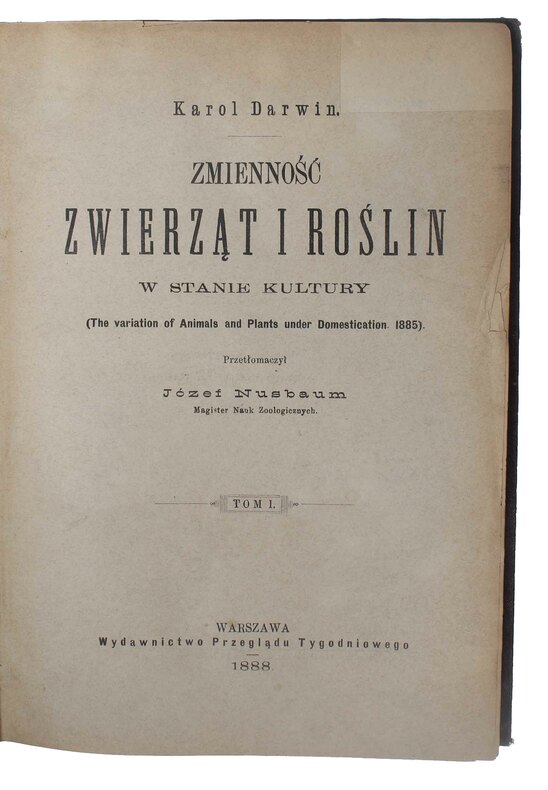
|
|
|
"MELVILLE HERMAN;DARWIN CHARLE""
LAS ENCANTADAS
2015. Paperback. Very Good-New. Rare book paperback
Bookseller reference : T141697 ISBN : 8494434020 9788494434020
|
|
|
"RUTHERFORD, ERNEST - NIELS BOHR - C.G. DARWIN. - THE DISCOVERY OF THE 'PROTON'.
The Structure of the Atom. (Rutherford) + (Darwin:) Collision of 'alpha' Particles with Light Atoms. + (Bohr:) On the Effect of Electric and Magnetic Fields on Spectral Lines
London, 1914. No wrappers, but stiched. All three papers contained in: ""Philosophical Magazine"", Sixth Series, Vol. 27. No. 159. March 1914. The whole issue issue offered (=no. 159): pp. 397-540 and 2 plates.Rutherford's paper.pp. 488-498. - Darwin's paper: pp. 499-506. - Bohr's paper: pp. 506-523. All clean and fine.
Bookseller reference : 41545
|
|
|
'DR. LISA HARK DR. DARWIN DEEN'
The Wholegrain Diet Miracle
Dorling Kindersley Publishers Ltd 2006-11-02. Paperback. Used:Good. Dorling Kindersley Publishers Ltd paperback
Bookseller reference : DADAX1405316896 ISBN : 1405316896 9781405316897
|
|
|
'DR. LISA HARK DR. DARWIN DEEN'
Wholegrain Diet Miracle Dk Diet
DORLING KINDERSLEY PUBLISHERS LTD. Used - Very Good. Very Good condition. DORLING KINDERSLEY PUBLISHERS LTD unknown
Bookseller reference : M04F-00477 ISBN : 1405316896 9781405316897
|
|
|
(Collectif)
HOMO, Le GENRE HUMAIN
Un ouvrage de 96 pages, format 130 x 220 mm, illustré, relié cartonnage couleurs, publié en 2000, PEMF, collection "30 Mots Clés pour Comprendre", bon état
Bookseller reference : LFA-126743694
|
|
|
(Grinovero Valentino)
Esposizione e critica del Darwinismo
In due parti: Cenni storici ed esposizione della dottrina Darwiniana; Critica del darwinismo (di parte cattolica). L'autore, sacerdote, dedica il libro all'arcivescovo di Udine Pietro Zamburlini. In buono stato
|
|
|
(MOORE Ruth - Redattori di LIFE) -
L'evoluzione.
Milano, Mondadori, 1964, 4to (cm. 28 x 21,5) cartonato con copertina illustrata a colori, pp. 192 completamente illustrato in nero e a colori (I Regni della Vita) .

|
|
|
-
Leggere Darwin.
Venezia, Tipografia commerciale, 1983, 8vo punto metallico, pp. 15

|
|
|
1809 1882 Darwin Charles
Papers On Pollination Multilingual Edition
Nabu Press 2011-10-07. Paperback. Good. Nabu Press paperback
Bookseller reference : SONG1247818578 ISBN : 1247818578 9781247818573

|
|